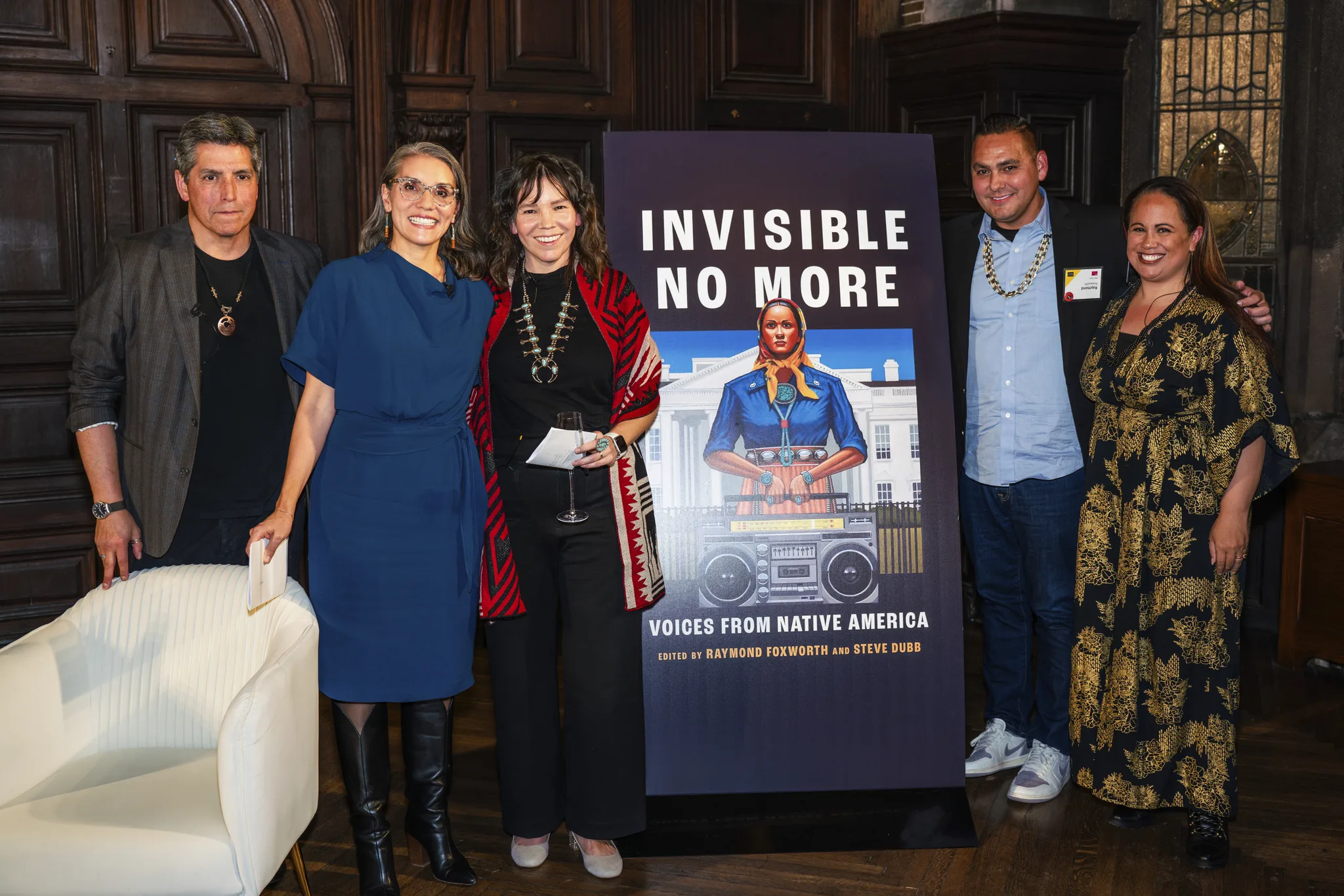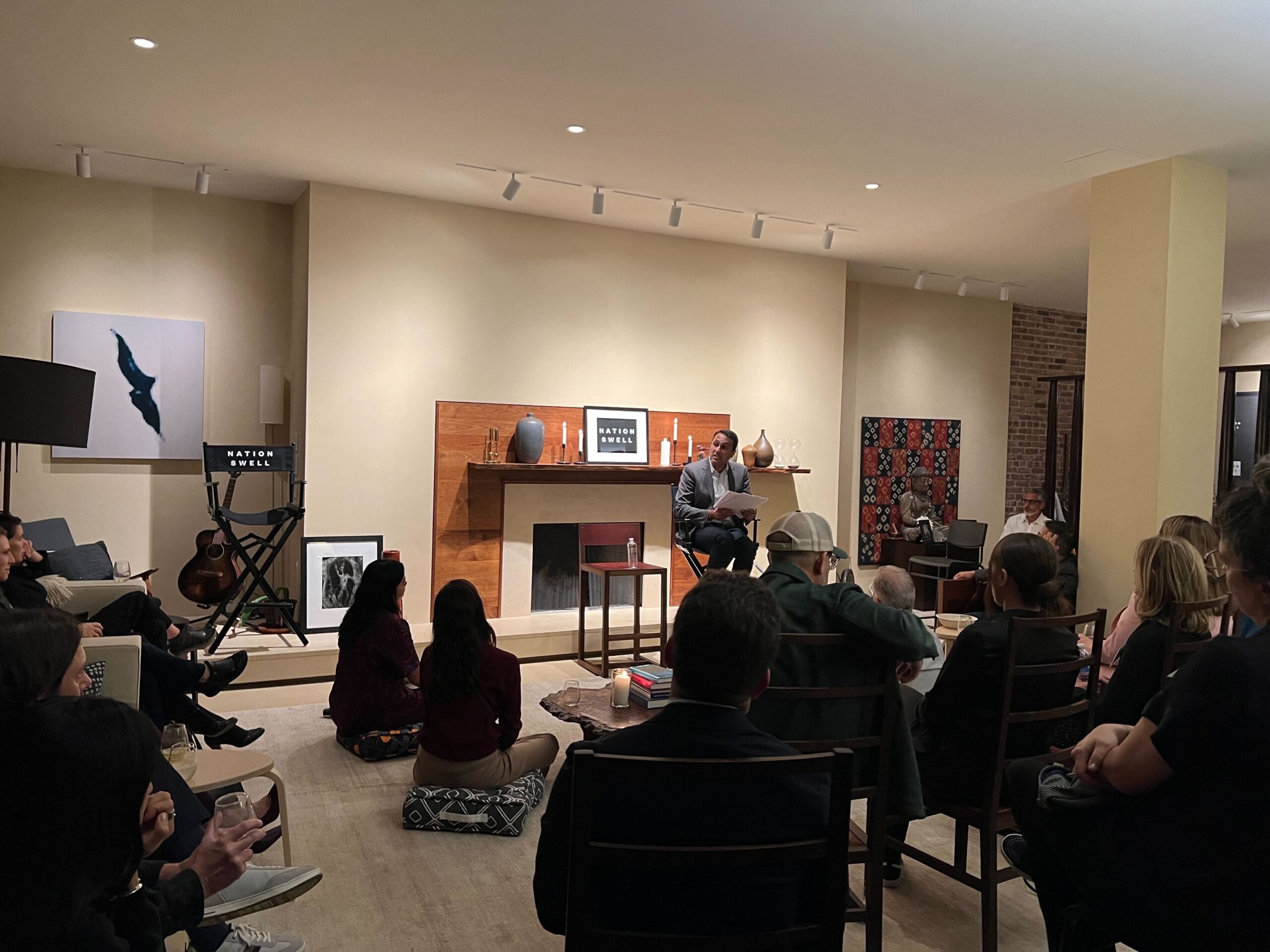Experts have been sounding the alarm on a quiet crisis unfolding across the country: Americans are more disconnected than ever. A growing body of research points to rising rates of loneliness, fraying community ties, and a deepening sense of isolation that cuts across age, geography, and background. The costs are profound — not only to individual mental and physical health, but to our collective resilience and social fabric.
Against this backdrop, the NationSwell Council set out in the second quarter of 2025 for a Salon series dedicated to “The Movement to Reconnect”: the tapestry of solutions — such as increasing funding, inclusive programs, and spaces for meaningful interaction — that help foster stronger, more resilient communities.. In a time when polarization and disconnection often dominate the headlines, these conversations offered something different: a reminder that healing is possible when we come together in warm, curious, and collaborative ways.
We’re proud to present a selection of the insights that were shared during the course of the series — along with some powerful reflections from the leaders in attendance — below:
Key Insights
1. Service creates shared purpose and builds belonging. Participating in service-oriented activities can strengthen community ties, provide individual meaning, and counteract divisive ideologies by grounding people in shared action.
2. Polarization is flattening our relationships — and our humanity. When people are reduced to their political or cultural identities, empathy and curiosity suffer. Creating space for constructive dialogue can restore dimensionality and connection.
3. We need both bonding and bridging. Affinity spaces allow individuals to recharge within shared identity groups, while bridging spaces foster trust and understanding across difference. Both are essential for social cohesion.
4. Ritual and moral frameworks matter for belonging. Practices like gratitude, storytelling, and trauma acknowledgment — often rooted in religious tradition — can be adapted to modern settings to foster collective meaning and connection.
5. Crises are catalysts for community renewal. Moments of collective hardship can serve as inflection points to rebuild stronger, more inclusive social bonds — if we seize them with creativity and shared values.
6. Narratives shape connection. Stories that emphasize resilience, interdependence, and shared futures foster unity; divisive or fear-based narratives drive alienation and distrust.
7. Inclusive, systemic solutions are needed. Programs alone won’t solve disconnection. True impact requires structural changes, inclusive design, and active participation from those most affected.
8. Connection must be resourced and rewarded. Sustained funding, capacity-building (like train-the-trainer models), and recognition for community leaders are critical to scaling what works.
9. Higher education and local communities are key incubators. Colleges and municipalities are well-positioned to model and scale tools for connection — but must build facilitation expertise and ground efforts in local realities.
10. We need a new metric of success: community care. As we reimagine what it means to thrive, collective well-being must be valued alongside personal achievement—centering care, interdependence, and shared responsibility.
11. Loneliness is a public health crisis — and Gen Z is at its center. Young people report record levels of loneliness and a lack of meaning or purpose, exacerbating the youth mental health crisis and signaling urgent need for systems-level support.
12. Human connection is both a basic need and a powerful social tool. Strong interpersonal bonds are essential for emotional well-being — and also serve as the foundation for broader societal resilience, civic trust, and collaborative problem-solving.
13. We lack spaces for spontaneous, organic interaction. Despite widespread desire for face-to-face connection, many communities lack accessible “bumping spaces” — like parks, plazas, and community centers — where casual encounters naturally occur.
14. Technology is distorting social norms and deepening disconnection. Social media has normalized passive communication and amplifies polarization, making it harder — especially for youth — to initiate in-person connection or bridge divides.
15. Connection across differences requires intention and infrastructure. People are eager to connect across race, class, and ideology, but few are given the tools, invitations, or safe settings to do so meaningfully.
Recommended Resources
- The Upswing, How America Came Together a Century Ago and How We Can Do It Again, Robert D. Putnam
- The Connection Opportunity, More in Common Report
- What Are “Social Prescriptions” and How Should They Be Integrated Into Care Plans?
- Slow ideas, Atul Gawande
- The Longest Table
- A Hidden Wholeness: The Journey Toward an Undivided Life, Parker J Palmer
- On the Table: Resource Guide, Chicago Community Trust,
- Union Capital Transforms Social Capital into Opportunity
- Mindful Discoveries with John Powell
- Spot the Scam
- Tool to Measure Workplace Loneliness
- Understood.org
- Understood podcast
- Einhorn Collaborative
- Dads for All
- Trust Labs
- National Good Neighbor Day
- Brand Story podcast
Reflections from Council members
We asked members in attendance to respond to the following prompt: “How can organizations redesign their workplace cultures to promote stronger interpersonal relationships and a sense of belonging among employees?”
“Workplaces are becoming more diverse, including more intergenerational with Gen Z, Millennials, Gen X, and Baby Boomers. It is necessary for them to adapt and create more inclusive environments. What is important is to humanize the workers. This can include opportunities to get to know each other. This goes beyond happy hours. It can be through ERGs. It can be through offsites. Options that speak to each generation and also identities that span generations is a strategy I have seen work.”
- King Adjei-Frimpong, Director of Stakeholder Engagement
“If an organization is fully remote or hybrid, it’s important to invest time and space for meaningful connection to take place online. For example, as part of your weekly team coordination call, have your team share what they did over the weekend. Or bring another prompt for people to respond to. When you do meet in person, make sure to allocate time for connecting and fun. Then, measure your employees’ sense of connection and loneliness at work with this following survey tool to see how well your employees are doing.”
- Calista Small, Research Manager, More in Common US
“Creating formal opportunities for employees to connect with each other outside of their day to day responsibilities can have a positive impact. At Girls Who Code, we recently had an org-wide step challenge (optional) with meaningful prizes for team and individual winners. Participants were broken up into random teams and it was a way for folks to have fun with and motivate each other to achieve wellness goals while instilling a little healthy competition.
Consistently using brief ice-breakers at the start of a meeting, whether cross-functional or within a team, provides a light-lift opportunity for folks to keep learning about one another and finding connections.”
- Tarika Barrett, CEO, Girls Who Code
“The “constant of change” is an invitation to reimagine workplace cultures, to harmonize feeling our best with doing our best. Innovation operates at the speed of trust, and we build velocity by forging affirmation, belonging, and co-creation across people and teams.
One of my favorite levers – aka antidotes versus the old normal – is storytelling. That is how we can flip disengagement into empowerment, for any generation. I also work with organizations to shape a unity of purpose around goals and processes, which breaks down silos. At a policy level, I am striving to radically reimagine decision making. If we can transform the rooms where it happens – through student advisory boards, Dad Councils, and more – we will catapult our north star goals.”
- Mohan Sivaloganathan, executive leader and keynote speaker
“I’ve learned from nearly two decades leading social impact organizations that belonging isn’t automatic. It emerges only when the conditions are right. Workplace cultures that foster belonging share a common characteristic — high trust between employees. I know from experience that trust begins with clarity. My mantra is to make the implicit explicit. Leaders do this by setting shared expectations, naming unspoken norms, creating space for authentic emotion (celebration and grief alike), and both setting policies and enforcing norms that make it safe for employees to bring their full selves to work. I’ve seen firsthand that, when that groundwork is in place and reinforced consistently, employees will connect and collaborate on a genuinely human level.”
- Bethany Rubin Henderson, CEO, Compass Pro Bono
“At the Movement to Reconnect Salon, I found myself most drawn to the question of how we intentionally create space for connection—especially across lines of difference. In a time when division can feel easier than dialogue, I believe deeply in the power of community-rooted relationships to shift what’s possible. Whether within organizations or broader communities, we need to design for belonging—not just hope it happens. That means slowing down, listening with curiosity, and prioritizing trust-building as real work.”
- Michael Pope, Executive Director, Youth Represent



